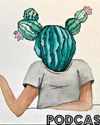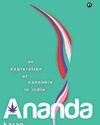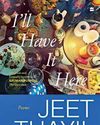A plant fix over a prescription drug? Some experts swear by it.

When I went for my annual medical check-up a couple of years ago, I told my doctor I suffered frequent constipation, despite a healthy diet. “Is there something I can take?” Rather than recommend a bottle of pills, she suggested I try something herbal, and have it daily: isabgul (also known as psyllium). It’s a powder made from the husks of the psyllium (Plantago ovata) plant that you can buy at local pharmacies or health food stores, without a prescription. You stir it into a glass of water and drink it. I followed my doctor’s advice to take a teaspoon twice daily and found that psyllium works for me.
At one time, plants were the only drugs we had. Then, along came antibiotics and other manufactured drugs, which have saved countless lives and continue to do so. However, today they’re not the only option; witness the thriving market in herbal remedies. A 2018 Reuters article cites a report by Market Research Future, which estimates that the global herbal market will reach US$111 billion by the end of 2023.
But beware: not all natural products are safe, says Dr Sarah Jarvis, a BBC medical columnist and general practitioner in London who sometimes recommends natural remedies. “Many plants are the basis for powerful manufactured medicines.”
Natural medicines can interact with other medications, and how much you should take varies depending on the individual. According to Dr Isaac Mathai, an internationally renowned holistic health expert from Bengaluru, “It is important to check with a doctor on what kind of supplements are required. Only licensed medical practitioners can identify potential underlying problems in your body. This information is critical in determining the right supplement and dosage, so avoid self-diagnosing.”
Bu hikaye Reader's Digest India dergisinin September 2018 sayısından alınmıştır.
Start your 7-day Magzter GOLD free trial to access thousands of curated premium stories, and 9,000+ magazines and newspapers.
Already a subscriber ? Giriş Yap
Bu hikaye Reader's Digest India dergisinin September 2018 sayısından alınmıştır.
Start your 7-day Magzter GOLD free trial to access thousands of curated premium stories, and 9,000+ magazines and newspapers.
Already a subscriber? Giriş Yap

ME & MY SHELF
Siddharth Kapila is a lawyer turned writer whose writing has focussed on issues surrounding Hinduism. His debut book, Tripping Down the Ganga: A Son's Exploration of Faith (Speaking Tiger) traces his seven-year-long journey along India's holiest river and his explorations into the nature of faith among believers and skeptics alike.

EMBEDDED FROM NPR
For all its flaws and shortcomings, some of which have come under the spotlight in recent years, NPR makes some of the best hardcore journalistic podcasts ever.

ANURAG MINUS VERMA PODCAST
Interview podcasts live and die not just on the strengths of the interviewer but also the range of participating guests.

WE'RE NOT KIDDING WITH MEHDI & FRIENDS
Since his exit from MSNBC, star anchor and journalist Mehdi Hasan has gone on to found Zeteo, an all-new media startup focussing on both news and analysis.

Ananda: An Exploration of Cannabis in India by Karan Madhok (Aleph)
Karan Madhok's Ananda is a lively, three-dimensional exploration of India's past and present relationship with cannabis.

I'll Have it Here: Poems by Jeet Thayil, (Fourth Estate)
For over three decades now, Jeet Thayil has been one of India's pre-eminent Englishlanguage poets.

Orbital by Samantha Harvey (Penguin Random House India)
Samantha Harvey became the latest winner of the Booker Prize last month for Orbital, a short, sharp shock of a novel about a group of astronauts aboard the International Space Station for a long-term mission.

She Defied All the Odds
When doctors told the McCoombes that spina bifida would severely limit their daughter's life, they refused to listen. So did the little girl

DO YOU DARE?
Two Danish businesswomen want us to start eating insects. It's good for the environment, but can consumers get over the yuck factor?

Searching for Santa Claus
Santa lives at the North Pole, right? Don't say that to the people of Rovaniemi in northern Finland